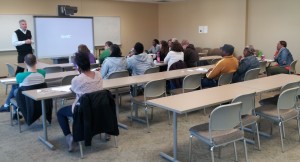Do you know that it is generally recommended that housing expenses shouldn’t be more than 30% of what you earn, leaving 70% of your income for food, clothing, and other necessities?
According to the US Department of Housing and Urban Development, approximately 12 million renters and homeowners are spending more than 50% of their income on housing, including utilities, thereby making it difficult for families to afford other necessities, i.e. transportation, clothes, food, entertainment, medical care, etc. Towards this end, in many American cities middle and upper income people are moving into neighborhoods that had previously suffered disinvestment and decay. These severely “house cost burdened” families want and/or need to move into sustainable neighborhoods accessible to more transportation options, affordable housing, jobs, businesses, services, and social activities.
These new residents renovate housing, stimulate business, and contribute to the tax base. Additionally, you have investors, who are purchasing these properties from low income families and stripping them of their equity, legacy, and property, which they worked hard to obtain and maintain for their children and grandchildren. These benefits of neighborhood revitalization are, in some cases, achieved at a potentially serious cost: the displacement of existing neighborhood residents by eviction, excessive code violations, increased property values/taxes, rent increases, changing demographics, etc.
Unfortunately, this may contribute to divisiveness, animosity, or ill feelings between longtime and new neighbors. This is quite unfortunate because what makes these central city neighborhoods and residents so special is their “sense of community” which has helped residents survive and thrive throughout the years!
There are strategies that can and/or should be implemented to safeguard longtime renters and homeowners, thereby bringing peace and unity in the community. Some strategies should include the examination of federal, state, and local policies toward neighborhood reinvestment and displacement, including various alternative approaches for dealing with this issue.
I applaud the City of Columbus and Franklin County Board of Commissioners for taking the initiative to be proactive in bringing unity in the community by preserving some stability in up-and-coming neighborhoods by:
- Establishing a Community Land Trust, which will contribute to the preservation of mixed income neighborhoods.
- Working with Developers to make sure a percentage of their housing development and employment opportunities are set aside for residents of various socio-economic strata!
- Offering the Homestead Tax Exemptions for low income senior citizens or disabled, who own and occupy their properties.
An example of another innovative strategy implemented in other major cities includes:
- Longtime Owner Occupancy Program (LOOP) – reducing or freezing property taxes to promote neighborhood stability and provide a dividend of sorts to those families who remained in the neighborhoods through the years of high crime, population loss, disinvestment, and declining property values (Washington, Boston, Pittsburgh, and Philadelphia).
Lastly, on a neighborhood level, there are strategies residents themselves are implementing to make a difference, including but not limited to the following:
For example, some of the activities Weinland Park residents have been involved in:
- Community Connectors – resident leaders, who advocate; market programs; organize events and bring diverse residents together, i.e. Rally in the Alley
- Community Clean-Ups – neighborhood focused beautification and clean-up efforts
- Community Civic Association – a group of residents and stakeholders who meet monthly and make decisions about the community, i.e. housing, safety, youth, etc.
- Community Zumba – a Latin inspired dance fitness class offered weekly for area residents, thereby affording children, youth, and adults of diverse backgrounds an opportunity to get acquainted and have fun with one another
- Community Gardens – residents, who use gardening as an opportunity to interact and get acquainted with other children, youth, and adults in the neighborhood


To learn more about OSU Extension – Community Development and what they’re doing to bring unity in your community, county, or throughout the State of Ohio, feel free to visit our website.
 Susan Colbert is the Franklin County Extension Program Director for Expansion and Engagement.
Susan Colbert is the Franklin County Extension Program Director for Expansion and Engagement.
The content of this site is published by the site owner(s) and is not a statement of advice, opinion, or information pertaining to The Ohio State University. Neither text, nor links to other websites, is reviewed or endorsed by The Ohio State University.
 These problems contribute to an inordinate high number of evictions; food insecurity; infant mortality rates; inability to get prescriptions and medical attention; mental, emotional, social and physical ills; and community development. Revenue from property taxes will decrease if families fail to make their mortgage payments. Neighborhoods will suffer with blight, disinvestment, and crime when properties are left vacant and abandoned, and public assistance budgets will surge.
These problems contribute to an inordinate high number of evictions; food insecurity; infant mortality rates; inability to get prescriptions and medical attention; mental, emotional, social and physical ills; and community development. Revenue from property taxes will decrease if families fail to make their mortgage payments. Neighborhoods will suffer with blight, disinvestment, and crime when properties are left vacant and abandoned, and public assistance budgets will surge.



 What do we need most to thrive in school, work and community? To be successful in life, children, youth and adults need a home. According to a recent article in The Columbus Dispatch, there is a shortfall of 54,000 affordable homes and apartments in Columbus, Ohio alone. Such shortages cause an increase in the number of “rent-burdened” renters, those who pay more than 30% of their income on rent and utilities. Unfortunately, this leaves very little for other necessities. Consequently, these families struggle to make ends meet and are forced to make hard choices between rent and food, medicine or transportation to work.
What do we need most to thrive in school, work and community? To be successful in life, children, youth and adults need a home. According to a recent article in The Columbus Dispatch, there is a shortfall of 54,000 affordable homes and apartments in Columbus, Ohio alone. Such shortages cause an increase in the number of “rent-burdened” renters, those who pay more than 30% of their income on rent and utilities. Unfortunately, this leaves very little for other necessities. Consequently, these families struggle to make ends meet and are forced to make hard choices between rent and food, medicine or transportation to work. OSU Extension forged a partnership with Increase CDC (Community Development Corporation) and the Ohio CDC Association and offers Individual Development Accounts (IDAs), a savings incentive program designed to help low-moderate income, working individuals accumulate assets (home ownership, microenterprise or post-secondary education).
OSU Extension forged a partnership with Increase CDC (Community Development Corporation) and the Ohio CDC Association and offers Individual Development Accounts (IDAs), a savings incentive program designed to help low-moderate income, working individuals accumulate assets (home ownership, microenterprise or post-secondary education). Towards that end, OSU Extension is proud to report that they are one of three organizations selected in the state of Ohio to receive funding from the Ohio Department of Commerce. OSU Extension will use this grant funding to help non-custodial parents, especially fathers, gain access to financial education, counseling and economic empowerment opportunities, thereby helping them remain compliant with the orders of the court, but moreover remaining active in the lives of their children.
Towards that end, OSU Extension is proud to report that they are one of three organizations selected in the state of Ohio to receive funding from the Ohio Department of Commerce. OSU Extension will use this grant funding to help non-custodial parents, especially fathers, gain access to financial education, counseling and economic empowerment opportunities, thereby helping them remain compliant with the orders of the court, but moreover remaining active in the lives of their children.
 How can we work together to increase personal financial security, address poverty and create economic opportunity? OSU Extension – University District, in collaboration with the Ohio CDC Association and Ohio Department of Jobs and Family Services, has joined the
How can we work together to increase personal financial security, address poverty and create economic opportunity? OSU Extension – University District, in collaboration with the Ohio CDC Association and Ohio Department of Jobs and Family Services, has joined the  OSU Extension is able to provide supportive services to Franklin County BAFF participants in collaboration with community, civic, corporate, collegiate and church partners. These programs and services include
OSU Extension is able to provide supportive services to Franklin County BAFF participants in collaboration with community, civic, corporate, collegiate and church partners. These programs and services include